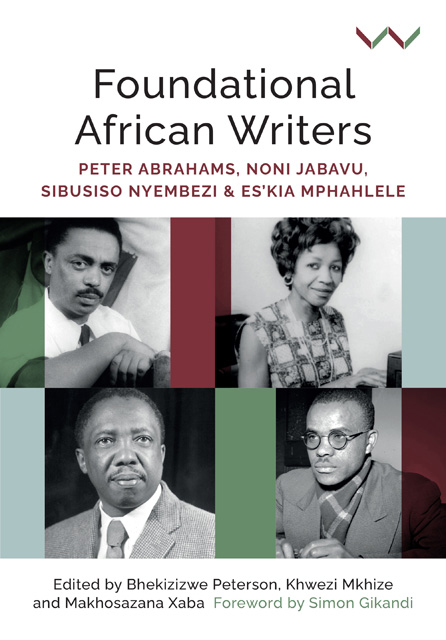Book contents
- Frontmatter
- Contents
- List of illustrations
- Foreword
- Acknowledgements
- Tribute to Professor Bhekizizwe Peterson
- Introduction
- Part I Remapping and Rereading African Literature and Cultural Production
- Part II South Africa and Fugitive Imaginaries
- Part III In the Eye of the Short Century: Diaspora and Pan-Africanism Reconsidered
- Contributors
- Index
Introduction
Published online by Cambridge University Press: 01 September 2022
- Frontmatter
- Contents
- List of illustrations
- Foreword
- Acknowledgements
- Tribute to Professor Bhekizizwe Peterson
- Introduction
- Part I Remapping and Rereading African Literature and Cultural Production
- Part II South Africa and Fugitive Imaginaries
- Part III In the Eye of the Short Century: Diaspora and Pan-Africanism Reconsidered
- Contributors
- Index
Summary
The essays in this collection were presented at a colloquium and panels convened in 2019 in celebration of the centenaries of Peter Abrahams (3 March 1919−18 January 2017), Noni Jabavu (20 August 1919−18 June 2008), Sibusiso Cyril Lincoln Nyembezi (6 December 1919−25 June 2000) and Ezekiel ‘Es’kia’ Mphahlele (17 December 1919−27 October 2008). All four centenarians lived rich and diverse lives and moulded careers that were protean. While Nyembezi remained in South Africa, the other three left the country at different ages and for varied reasons. Jabavu left in 1933 (at the age of thirteen to study in England); Abrahams in 1939 (in search of a less racially constrictive environment that he deemed essential for his pursuit of writing as a career); and Mphahlele departed in 1957 amidst increasing racial discrimination and repression in South Africa. Abrahams, Jabavu and Mphahlele each had peripatetic journeys, living for periods of time in West and East Africa, Europe, the USA and the Caribbean. Whether located in South Africa or making criss-crossing triangular journeys across the world, all four centenarians produced more than a half-century of foundational writing and cultural outputs spanning orature, fiction, autobiography, poetry, criticism, essays and journalism. Their writing was matched and deeply expanded by their participation in a wide range of political, educational, institutional and cultural initiatives that were aimed at fostering individual and group expression and development.
The lives and works of the centenarians provide a rich and challenging oeuvre that engages with complex historical, political and cultural experiences and questions. Noteworthy is the fact that the range and scope of their imaginations, reflections and social interventions span conventional disciplinary divides. This collection, in the same spirit, is informed by insights and approaches from disciplines as varied as literary criticism, cultural studies, history, political science, sociology, psychology and anthropology. The individual essays, in addition, are equally transdisciplinary in their perspectives and modalities. At stake in the collection are two aims: to explore the key texts and projects that the centenarians were involved in and to consider whether their legacies still resonate in the present.
- Type
- Chapter
- Information
- Foundational African WritersPeter Abrahams, Noni Jabavu, Sibusiso Nyembezi and Es'kia Mphahlele, pp. 1 - 24Publisher: Wits University PressPrint publication year: 2022



